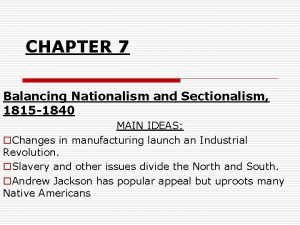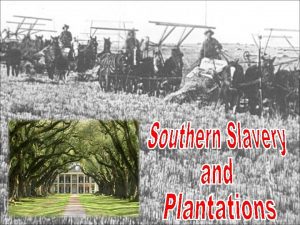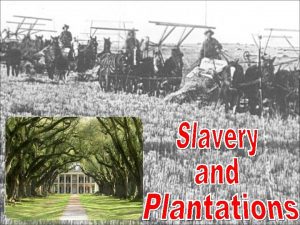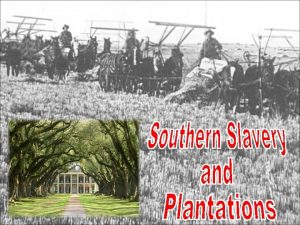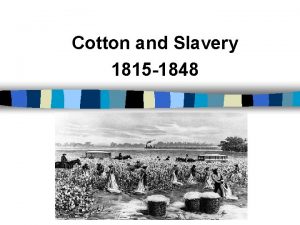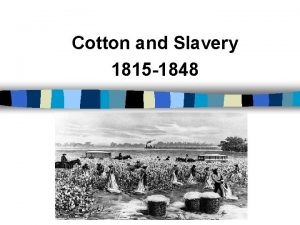Cotton and the Cotton Gin Eli Whitney in










- Slides: 10

Cotton and the Cotton Gin Eli Whitney in 1793 invented a machine for separating cotton seeds from its fiber ¡ Increased the amount cotton growers could process each day ¡ The gin used wire teeth on a turning cylinder to separate the seed from fiber ¡ The invention resulted in the need for more slaves. Slave population drastically increased in the South. ¡

The Mechanical Reaper Cyrus Mc. Cormick invented a machine to cut grain in a field ¡ Wooden paddles attached to a horse’s harness allowed six times more grain to be cut per day than previous methods ¡ Georgia farmers could work larger and more profitable farms with these agricultural machines ¡

RAILROADS 1830 First locomotive service – Charleston, SC ¡ 1833 GA General Assembly approved 2 companies to build railroads ¡ l l GA RR Co – west from Augusta to Madison, Eatonton, & Athens (reached Athens 1841) Central of GA RR – Savannah to Macon (reached Macon 1843)

RAILROADS CON’T ¡ Western & Atlantic (W&A) RR connected Augusta, Macon, Milledgeville & Columbus l l RR end = Terminus, later Marthasville 1847 Marthasville grew – over 400 people ¡ l Name not appropriate for RR center…. changed to Atlanta after Western & Atlantic W&A connected Atlanta to Chattanooga

RAILROADS CON’T ¡ 1853 Atlanta & West Point RR linked Georgia’s RR system to Alabama

Terminus ¡ Located at the southern end of a rail line that originated in Chattanooga, Tennessee ¡ Later renamed Marthasville, after the daughter of former Governor Wilson Lumpkin ¡ Marthasville became Atlanta, and the capital of Georgia ¡ Rail lines greatly reduced travel time for people and freight Click to return to Table of Contents

WATERWAYS ¡ ¡ ¡ Savannah River – most important Rivers – North to South paths Trading cities developed on rivers l l Milledgeville on Oconee Macon on Ocumulgee Augusta on Savannah Columbus on Chattahoochee

ROADS ¡ 1775 First Road Law—men, ages 16 -60, had to help maintain roads • Most Georgia roads ran east to west; they were former Indian footpaths • Plank roads over wetlands that featured “pikes” or gates were called turnpikes • Travelers paid a toll, or fee at each pike; the Old Federal Road connected Athens north to Tennessee

Depression and the Panic of 1837 Many Georgia banks failed between 1837 and the early 1840 s ¡ This happened during a depression (a sharp economic downturn) ¡ Many business failed; many farmers and planters lost their land ¡ Many banks didn’t have enough cash to pay out money their depositors had entrusted to them ¡

Application Activity 1) Write a paragraph addressing how the Cotton Gin impacted the increase in the slave population. 2) The rise of railroads in the early 1800’s was a significant advancement to transport goods from one place to another which significantly impacted their lives. What technological advancement today (within 5 -10 years) has made a significant impact on our daily lives? 3) Most Important - Based on what we have studied yesterday and today, which had the most impact on the development of Georgia? Why? Explain. Today we will be learning about westward expansion because without expansion Cobb County would not be here, therefore we would not be here in Cobb.






